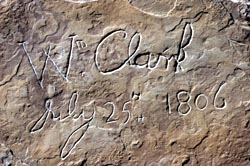OK, as I search the annals of my historical mind (it was a quick search

), I seem to be thinking of draftees that are of historical importance to myself.
So if my choices don't pass muster with the gallery, go easy, they're important to me!
With my first pick, I submit in the
Explorer/Discoverer category:
William Clark of the Corps of Dscovery.

The discoveries Clark and the other members of the "Corps of Discovery" were more than geographical. Their keen detail to the sciences led to many discoveries and breakthroughs for the time. (though in my link, I'm sure the Native Americans would not think that they were "discovered" exactly.)
Discoveries made by the Corps of Discovery:
http://www.nationalgeographic.com/le...scoveries.html
The entire journey is fascinating, and "Undaunted Courage" by Ambrose is a great book on the matter. The way that they proceeded through cooperation with the native peoples should really be a testament to the success of this mission that was truly a failure in the prime objective.
The expedition followed the Missouri River and passed through where my hometown of Wolf Point, MT lies in May of 1805. It was said that this was where their first account of a Grizzly Bear happened. Tracks had been seen in the Dakotas, but no sightings.
On the way back from the Pacific, Clark and a group of others split from the group and followed the Yellowstone River and passed through the current place I hang my hat:
Quote:
|
In early July, Lewis and Clark decided to divide into two groups to see more of the area. Clark took a group with him to explore the Yellowstone River. During this part of the journey, he named a rock formation after Sacagawea's son, calling it Pompy's Tower. The formation stands near what is now Billings, Montana, and bears the only physical trace of the entire expedition's path—"W Clark July 25 1806" carved on its surface.
|
http://www.biography.com/articles/William-Clark-9249584

Clark would continue on to become Governor of the Missouri Territory as well as serve in the Office of Indian Affairs, becoming Superintendent in 1822. He served in this position until shortly before his death in 1838.
http://www.pbs.org/weta/thewest/people/a_c/clark.htm